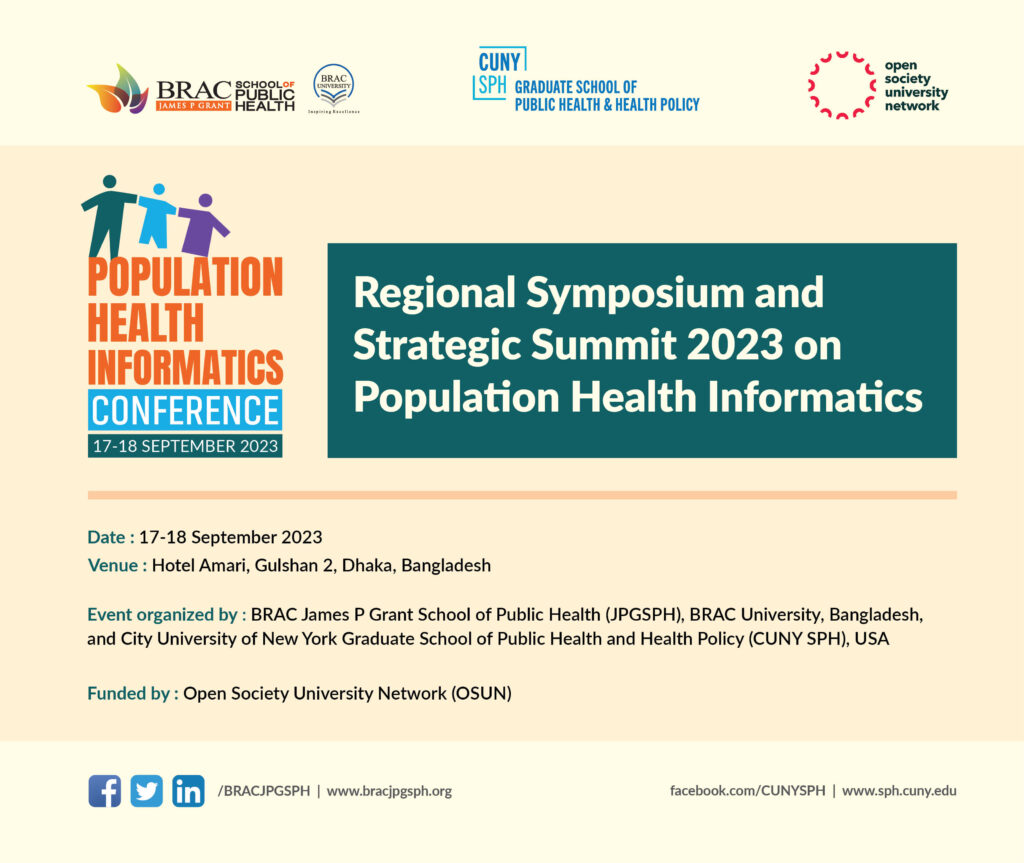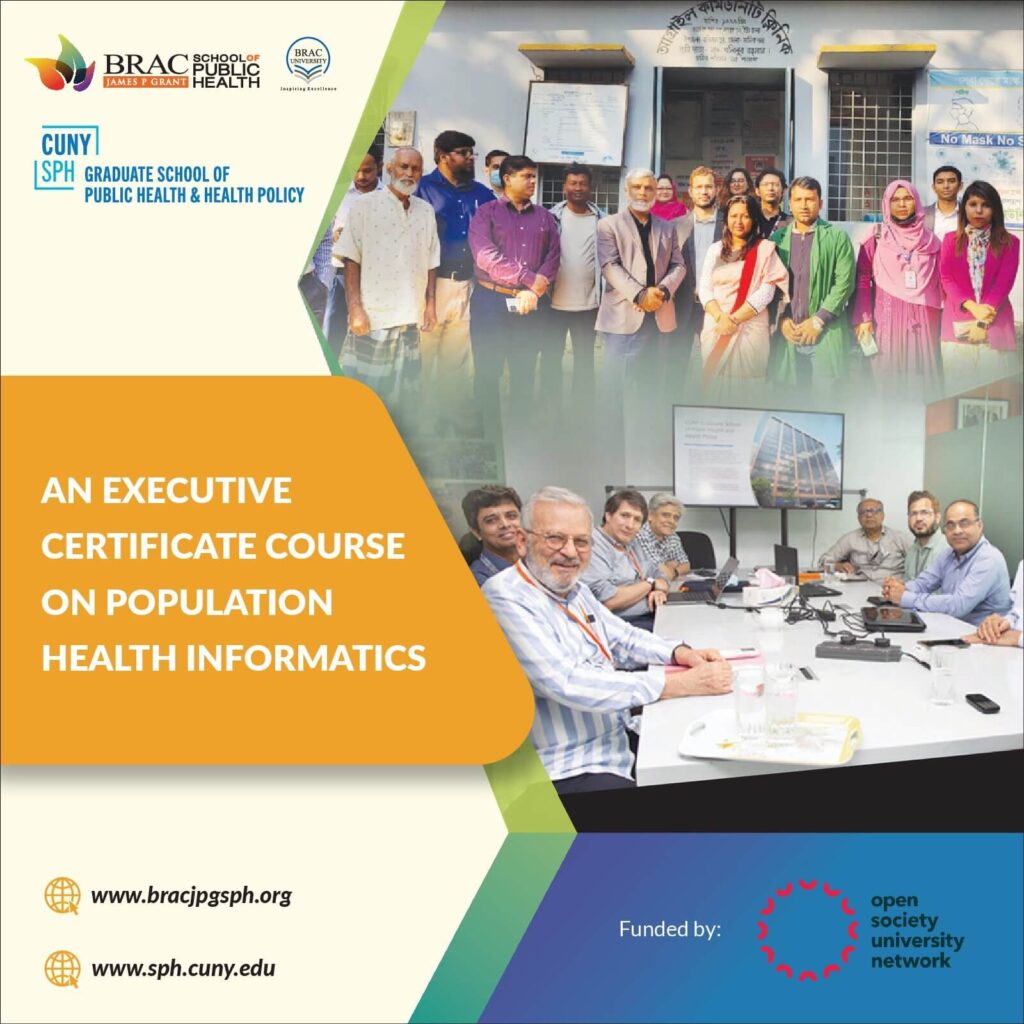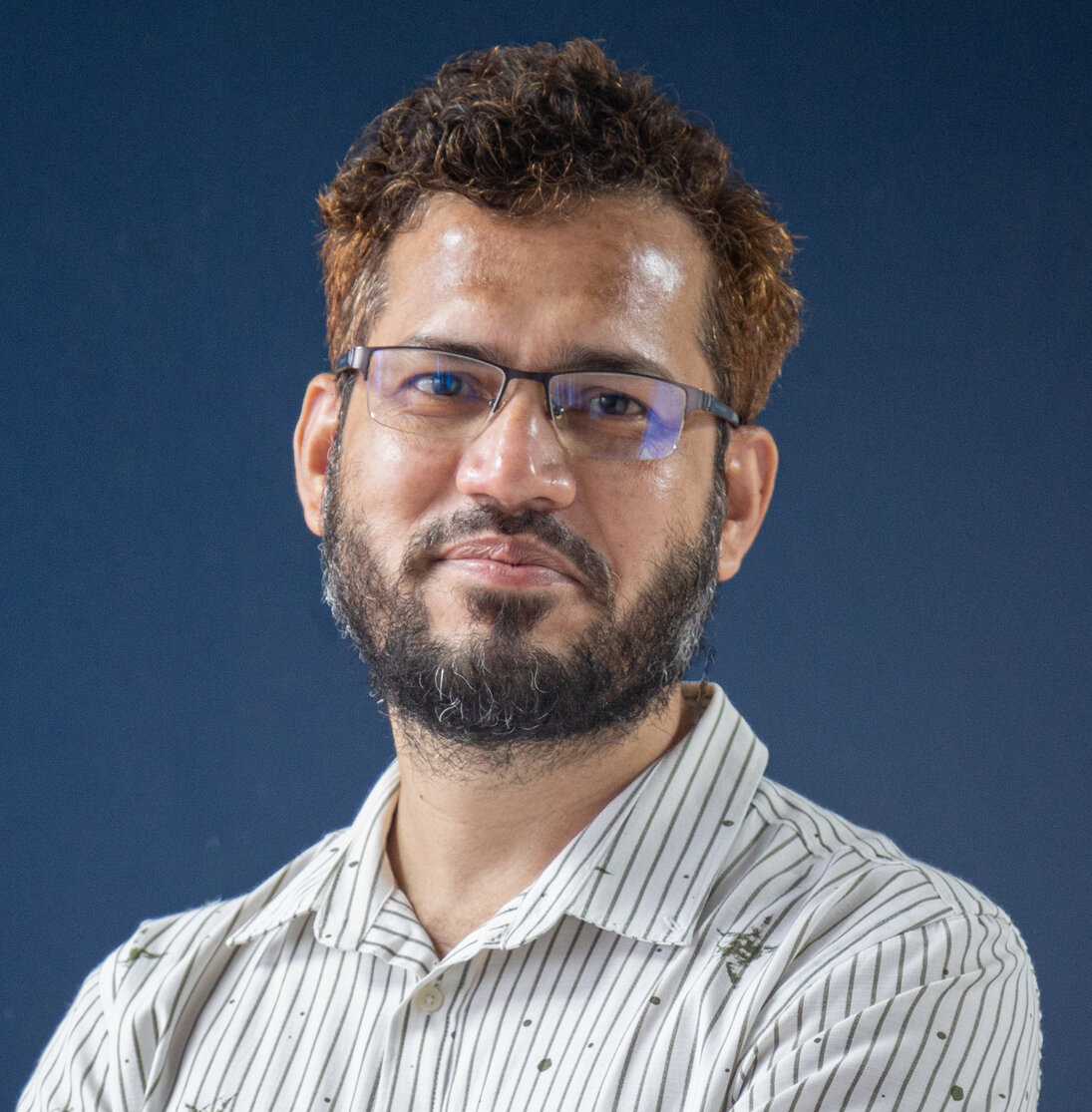Population Health Informatics
Education Hub
Upcoming Event

BRAC JPGSPH and CUNY SPH are organizing a second “Regional Symposium and Strategic Summit 2023 on Population Health Informatics”. This summit is the second event towards establishing a Regional Hub on Population Health Informatics in South and Southeast Asia focused on this important discipline of practice in public health. The initiative is funded by the Open Society University Network. Please contact the following persons for more information on the event or to join the event: Ribica Chowdhury (ribica.chowdhury@bracu.ac.bd).
BRAC JPGSPH and CUNY SPH are organizing a second “Regional Symposium and Strategic Summit 2023 on Population Health Informatics”. This summit is the second event towards establishing a Regional Hub on Population Health Informatics in South and Southeast Asia focused on this important discipline of practice in public health. The initiative is funded by the Open Society University Network. Please contact the following persons for more information on the event or to join the event: Ribica Chowdhury
Purpose
The main purpose of this initiative is to deliver collaboratively an experiential learning-based certificate program in Population Health Informatics by the City University of New York (CUNY) Graduate School of Public Health and Health Policy and BRAC James P Grant School of Public Health (JPGSPH), BRAC University. Management Information System (MIS) of the Directorate General of Health Services (DGHS) will contribute to the project as a valuable partner representing the Government of Bangladesh.
The program will create a skilled workforce in Population Health Informatics in the South and Southeast Asian region, essential to solving complex public health challenges of the 21st century. The scope of this project lies beyond the capacity building of the health professionals in this region. Individuals trained will use principles of population health informatics to design, develop, implement, and evaluate human-centered technology-enabled interventions and innovations using community data at the grassroots level to guide informed decision-making.
Training Program
Several objectives of the proposed project include:
- Offer collaboratively executive Population Health Informatics training program
- Creation of Experiential learning opportunities in Population health informatics
- Infrastructure development for population health informatics training and learning opportunity.
- Applying principles of population health informatics learning towards community data to enhance health and well-being of individuals, populations and communities they live in.
- Create a regional network of experts in the field ready to respond as a team to the next public health challenge
The main purpose of this initiative is to deliver collaboratively an experiential learning-based certificate program in Population Health Informatics by the City University of New York (CUNY) Graduate School of Public Health and Health Policy and BRAC James P Grant School of Public Health (JPGSPH), BRAC University. Management Information System (MIS) of the Directorate General of Health Services (DGHS) will contribute to the project as a valuable partner representing the Government of Bangladesh.
The program will create a skilled workforce in Population Health Informatics in the South and Southeast Asian region, essential to solving complex public health challenges of the 21st century. The scope of this project lies beyond the capacity building of the health professionals in this region. Individuals trained will use principles of population health informatics to design, develop, implement, and evaluate human-centered technology-enabled interventions and innovations using community data at the grassroots level to guide informed decision-making.
The proposed program will initially target public health students, public health practitioners, and faculty to create a sufficient cadre of population health informatics trainees. The program will also be offered regionally in the South and Southeast Asia region to other public health researchers, practitioners, health professionals, and policymakers from all related disciplines, including medicine, public health, allied health sciences, information systems, computer science, engineering, management, and hospital administration.
Core Team
Collaborating Institutes
Students of Population Health Informatics Executive Certificate Course
About the Course

Faculty
Dr. Shah Ali Akbar Ashrafi is working with Ministry of Health and Family Welfare in Bangladesh since April 1994. Currently he is working as Chief, Health Information Unit under Directorate General of Health Services. He has vast experiences in the field of Routine Immunization, Vaccine Preventable Disease (VPD) Surveillance, CRVS and Health Information.
Dr Zahidul Quayyum, is a Professor, Co-Director of the Centre of Excellence for Urban Equity and Health, and the Technical Adviser to the Centre of Excellence for Health Systems and Universal Health Coverage at BRAC JPGSPH. With over 20 years of experience in conducting health economics research and teaching in UK universities, He has worked for many international research projects, mainly economic evaluation models for safe motherhood interventions strategies and economic analysis of government interventions and policy changes for improving maternal and child health. Dr Quayyum was also a founding faculty member at the Institute of Health Economics of Dhaka University. https://www.bracu.ac.bd/about/people/zahidul-quayyum-phd
Prof Atonu Rabbani is an Associate Professor in the Department of Economics at the University of Dhaka, and adjunct faculty at the James P Grant School of Public Health at the BRAC University. He has academic affiliations with JPAL (MIT), International Growth Centre (IGC, based at LSE and Oxford), Centre for Evaluation and Development (C4ED, Mannheim) and Centre for Development Economics and Sustainability (CDES, Monash University). He is also an advisor at South Asian Network for Development and Environmental Economics (SANDEE). Previously, he had worked as a full-time Research Fellow at the Institute of Microfinance (InM). Before that he had worked as a Post-Doctoral Fellow with the Department of Medicine and Center for Health and Social Science (CHeSS) at the University of Chicago.
http://ergonline.org/profile-atonurabbani-7/#1536995612157-b2f32e71-1da4
Prof Shaikh A. Shahed Hossain is a Professor at BRAC JPGSPH, BRAC University and former scientist at icddr,b. Dr. Hossain is an author with the Cochrane Group and is trained in systematic review processes with Cochrane “Effective Practice and organization of Care (EPOC) group. He is also engaged in teaching and training with Technical Training Unit of icddr,b (TTU), North South University, and Bangabandhu Sheikh Mujib Medical University (BSMMU).
A/Prof Siyan Yi is Assistant Professor at the National University of Singapore and Director, KHANA Center for Population Health Research, Cambodia. He has been working on improving the health of key populations in Cambodia for over ten years.
https://sph.nus.edu.sg/faculty-directory/yi-siyan/
Dr. Ataur Rahman, a medical graduate with a post-graduate degree in Reproductive and Sexual Health Research from the London School of Hygiene and Tropical Medicine, has 30 years of research and programme delivery experience in the field of Sexual and Reproductive Health and Rights (SRHR) and Urban Poor, including nutrition. Dr. Rahman has working experience in the fragile environment in countries like Iran and Afghanistan. Before joining JPGSPH as Director of CPSD, he was the Director Programme of the International Planned Parenthood Federation’s Regional Office in New Delhi and later in Bangkok.
Faculty
Dr. Ayman El-Mohandes is the current Dean of the CUNY GSPHHP. He has been serving as the dean since 2013. He is an internationally recognized leader in the field of public health, a paediatrician, epidemiologist, and an academician with a deep commitment to bringing recognition to exceptional young public health professionals. https://sph.cuny.edu/about/people/faculty/ayman-el-mohandes/
Dr Ashish Joshi is a global expert in population health informatics and is a primary author of the first book on “Population Health Informatics: Driving Evidence based solutions into Practice”. He is also a recently elected Chair of Global Health informatics Working group at American Medical Informatics Association. He was the founding member of the CUNY SPH within the CUNY system as an independent graduate school and initiated the Master of Science program in Population Health Informatics under CUNY SPH.
Dr Jose Florez-Arango is an Assistant Professor/Academic Program Director, Department of Population Health Sciences, Weill Cornell Medicine. He was a Fulbright scholar and has experience in emergency medicine, prehospital care and emergency management, tropical diseases, global health, and telemedicine. As an Informatician, his previous experience includes clinical decision support systems, development of health information systems based-on international standards, mHealth, human-computer interaction, human factors, interoperability and controlled vocabularies.
http://www.josefflorezarango.com/index.php/home/
Dr Md. Tanvir Hasan is currently working as an Associate Professor and Co-Director of Centre of Excellence for Urban Equity and Health (CUEH) at BRAC James P Grant School of Public Health (JPGSPH), BRAC University. He has more than 12 years of teaching and research experience. His expertise is in advanced statistical analysis, mixed methods research, evaluation research, longitudinal study and spatial epidemiological research.
https://new.bracjpgsph.org/staff-members-details/11118
Dr M. Shafiqur Rahman is an adjunct faculty and technical advisor (part time) at the BRAC JPGSPH, BRAC University. He is working as a Professor of Applied Statistics at the Institute of Statistical Research and Training, University of Dhaka. His main research areas include public health, epidemiology and biostatistics, focusing on development of new methods for analysing data in public health and medical research. He is a member of the Bangladesh Statistical Association, International Biometric Society, International Statistical Institute, International Society of Clinical Biostatistics and an educational ambassador of the American Statistical Association from Bangladesh. https://www.isrt.ac.bd/people/shafiq/
Prof Abul Kalam Azad is currently the Project Director of the Better Health in Bangladesh (BHB) project, led by the Management Sciences for Health (MSH). Dr. Azad joined MSH following retirement as the Director General of Health Services of Bangladesh, having served under the MoHFW for 37 years including professorial jobs in medical schools (1983-2020). During his tenure as Director General, Dr. Azad established one of the world’s most effective national digital health information systems. His strong leadership among health managers across the health system supported an effective response to several large-scale public health crises, including the influx of Rohingya refugees and outbreaks of the chikungunya virus, dengue, and COVID-19. He is known for his extensive expertise as a policy maker, implementer, health systems builder, health administrator and manager, eHealth promoter, public health specialist, researcher, medical teacher, and health activist.
Anis Fuad is a population health informatics researcher and lecturer. He has over 15 years of experience in various consultancies, research, and related activities with the Ministry of Health, BPJS Kesehatan, hospitals, district health offices, and private sectors. He has over 30 articles published in scientific journals and local newspapers. He is also a member of the AeHIN (Asia eHealth Information Network) working council. He has been appointed as the Head of the Data and Information Division of PERSI (Indonesian Hospital Association) since 2021. He is currently the Head of the Cross-Cutting
Research Group at the UGM Center for Tropical Medicine.
Experiential Learning
The experiential learning component is an integral component of the program; Students will acquire skills and the necessary education to apply principles of population health informatics towards several emerging regional public health issues such as migration, environmental and climate health, chronic-non communicable diseases, emerging infectious diseases, health rights, etc. across diverse settings.
The program will provide an opportunity to each student for individual experiential learning projects in any population health informatics research topic. The individual projects will be directly supervised by the faculty of Population Health Informatics (PHI) executive certificate course program to give the students a real-time experience in population health informatics research.










